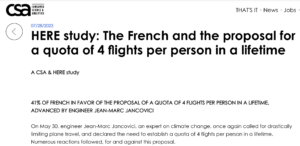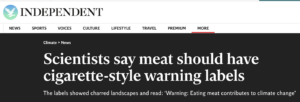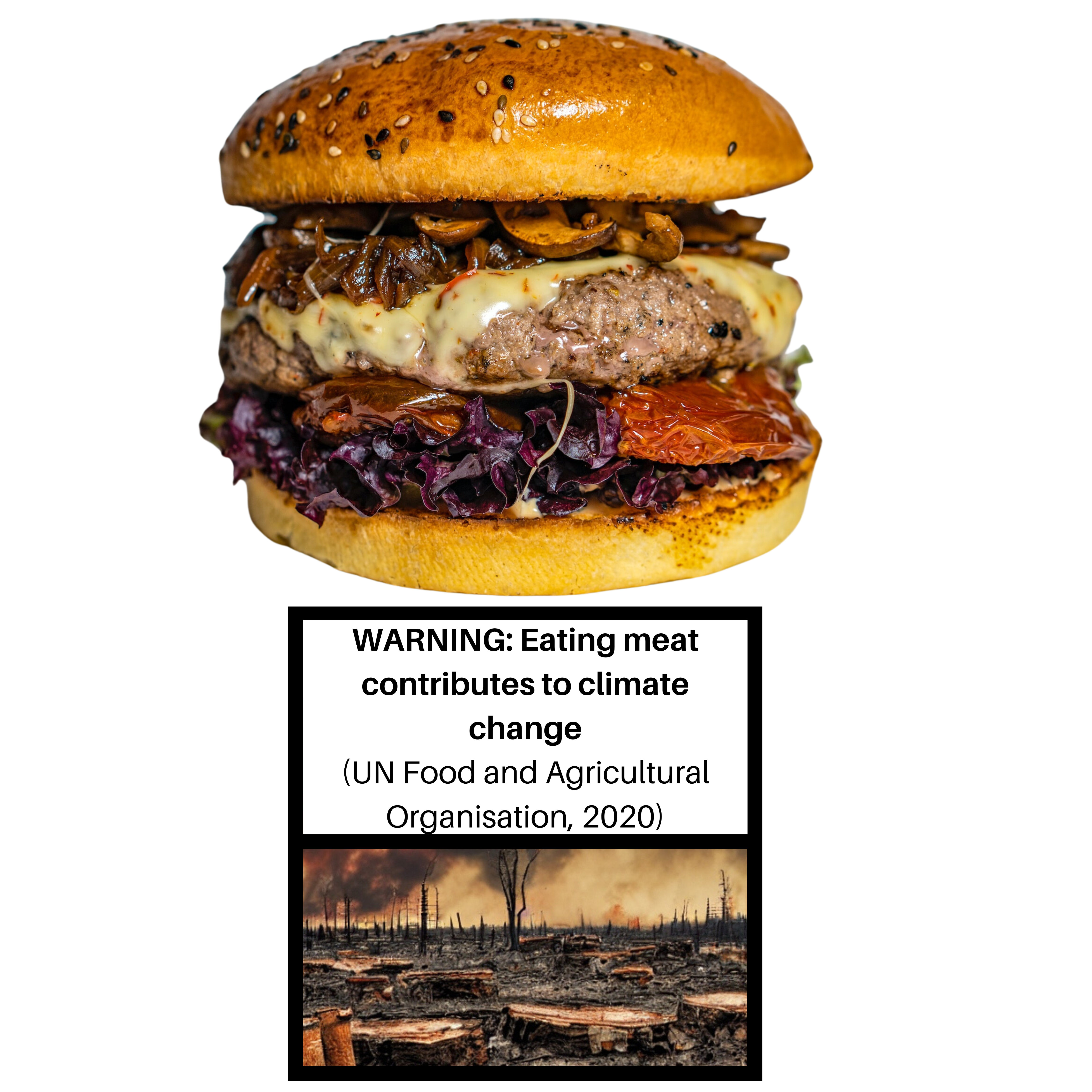We’re Saved!? UN declares: ‘Whether you like it or not, fossil fuel phase out inevitable’ – Morano: UN ‘is literally psychotic…We have to say HELL NO to idea of Net Zero!’

Hug your children today! The UN has struck a deal to end fossil fuels & save the planet! Watch: Morano on Fox w/ Varney on UN climate summit: ‘We have to say HELL NO’ to this whole idea of Net Zero’ – ‘This is an insane goal. It’s an insane meeting’ Varney & Co. […]
CNN: ‘It’s time to limit how often we can travel abroad – ‘Carbon Passports’ may be the answer’ – ‘Drastic changes to our travel habits are inevitable’ – Suggests restrictions will be ‘forced’ upon public
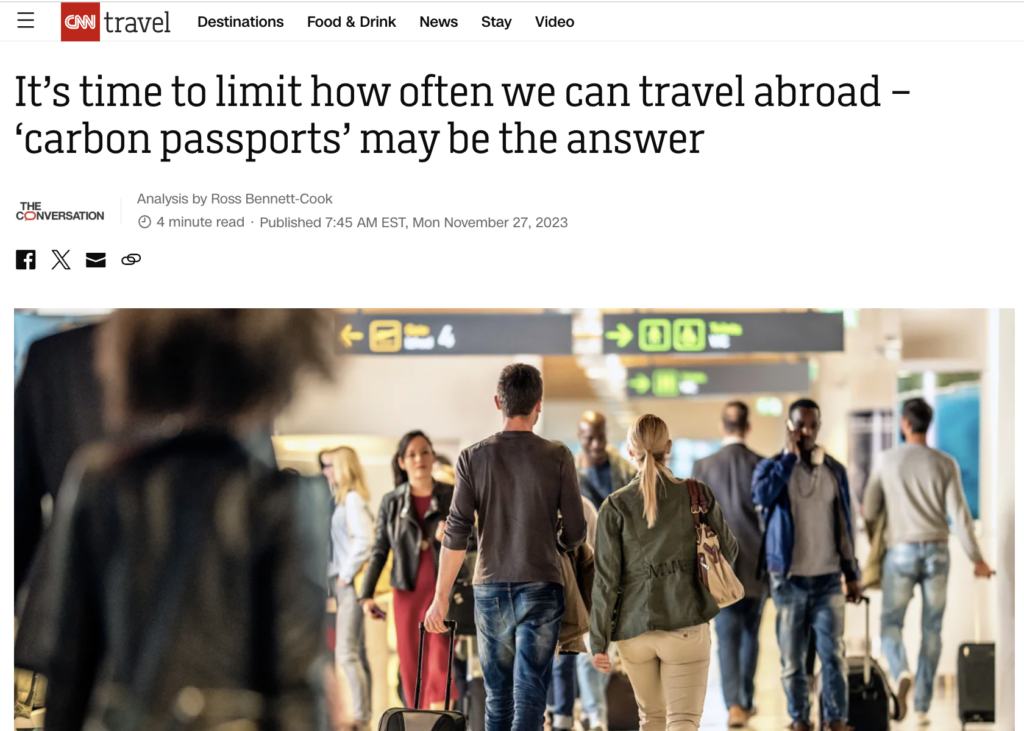
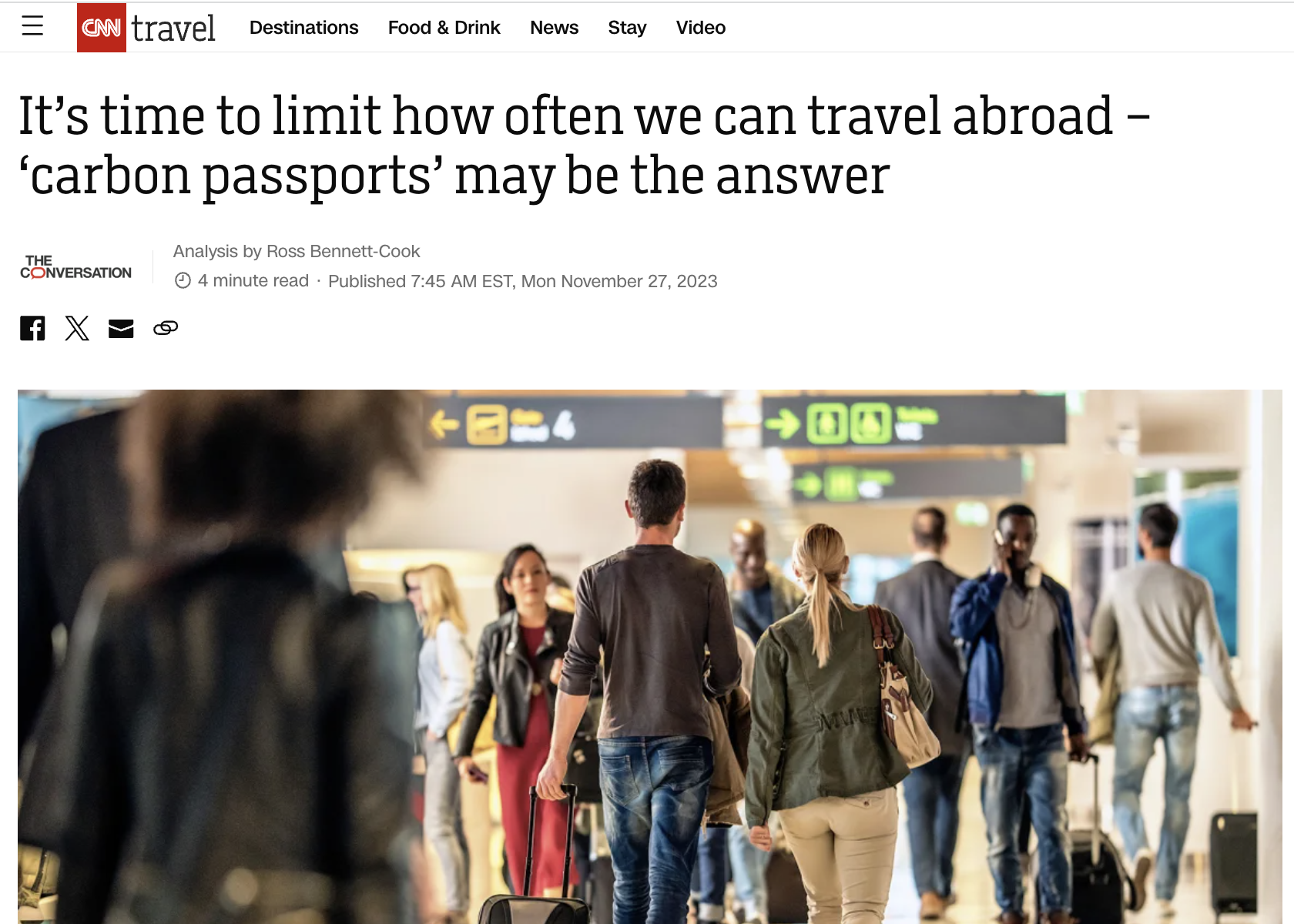
CNN Travel:
“Holidaymakers should prepare to change their travel habits now, before this change is forced upon them.”
“The negative impacts of tourism on the environment have become so severe that some are suggesting drastic changes to our travel habits are inevitable. In a report from 2023 that analyzed the future of sustainable travel, tour operator Intrepid Travel proposed that “carbon passports” will soon become a reality if the tourism industry hopes to survive. …
What is a carbon passport? The idea of a carbon passport centers on each traveler being assigned a yearly carbon allowance that they cannot exceed. These allowances can then “ration” travel. … The average annual carbon footprint for a person in the US is 16 tons – one of the highest rates in the world. In the UK this figure sits at 11.7 tons, still more than five times the figure recommended by the Paris Agreement … the average global carbon footprint needs to drop to under two tons by 2050. This figure equates to around two roundtrip flights between London and New York.
Intrepid Travel’s report predicts that we will see carbon passports in action by 2040. For emission reductions to have any meaningful effect, ticket prices would have to rise by 1.4% each year, discouraging some people from flying. …
Some European countries are beginning to take measures to reduce air travel. As of April 1, 2023, passengers on short-haul flights and older aircraft in Belgium have been subject to increased taxes to encourage alternative forms of travel.
Less than two months later, France banned short-haul domestic flights where the same trip can be made by train in two-and-a-half hours or less. Spain is expected to follow suit.
A similar scheme could also be on the horizon for Germany. In 2021, a YouGov poll found that 70% of Germans would support such measures to fight climate change if alternative transport routes like trains or ships were available.
An investigation by the European Federation for Transport and Environment in 2023 found that cruise ships pump four times as many sulphuric gases
Holidaymakers should prepare to change their travel habits now, before this change is forced upon them.
#
Yahoo Finance: Could a ‘carbon passport’ be introduced for holidaymakers? – A carbon passport, as envisioned by Intrepid Travel, would be a passport that assigns each traveller an annual carbon footprint, which they cannot surpass.
“By 2040, we can expect to see limitations imposed on the amount of travel that is permitted each year.” They added: “By 2040, it will be unusual to see members of Generation Alpha without a carbon-footprint tracker on their smartphones. Every Uber ride, plane journey, and trip to the supermarket will be logged in their devices, noting their carbon footprint in real time.”
Related:
Great Reset By Marc Morano – Chapter 12 Excerpt: ‘COVID Lockdowns Morph to Climate Lockdowns’
UK Independent: Adding graphic, cigarette pack-style warnings to meat-based meals had a significant impact on people’s decisions to choose them, according to new research. Scientists from Durham University in the UK came up with the novel approach to cutting meat consumption which, alongside dairy, accounts for about one-seventh of global emissions. … The scientists took a group of 1,000 meat-eating adults and split them into four groups. The participants were then shown pictures of hot meals tagged with a climate, health or pandemic warning, or no label. “As warning labels have already been shown to reduce smoking as well as drinking of sugary drinks and alcohol, using a warning label on meat-containing products could help us achieve this if introduced as national policy,” said Jack Hughes, the study’s lead author. Flashback: Former UN Climate Chief: Meat eaters should be banished, treated ‘the same way that smokers are treated” – “How about restaurants in 10-15 years start treating carnivores the same way that smokers are treated?” Figueres suggested during a recent conference. “If they want to eat meat, they can do it outside the restaurant.” NYU Bioethicist Prof. Liao on Eating meat: Seeks to ‘Make ourselves allergic to those proteins…unpleasant reaction…The way we can do that is to create some sort of meat patch’ – ‘Kind of like a nicotine patch where you put it on before you go to dinner go out to a restaurant and this will curb your enthusiasm for eating meat’. Flashback: Watch: NYT Bioethicist Matthew Liao: In order to tackle “climate change”, humans should be genetically modified to be intolerant to meat. “If we eat less meat, we could significantly reduce our greenhouse gas emissions. Now, some people would be willing to eat less meat, but they lack the willpower. Human engineering could help… We could artificially induce intolerance to meat, and in this way, we can create an aversion to eating eco unfriendly food.” Source: https://youtu.be/AcaKMu7I6vU https://nymag.com/intelligencer/article/covid-lockdowns-big-fail-joe-nocera-bethany-mclean-book-excerpt.html By Joe Nocera and Bethany McLean Until the Chinese government deployed this tactic, a strict batten-down-the-hatches approach had never been used before to combat a pandemic. Yes, for centuries infected people had been quarantined in their homes, where they would either recover or die. But that was very different from locking down an entire city; the World […]
https://www.forbes.com/sites/judeclemente/2023/10/15/reality-bites-why-wind-solar-and-electric-car-advocates-must-also-love-fossil-fuels/ By Jude Clemente Let’s start with the basics: fossil fuels supply 80% of the world’s energy and about 80% of the energy consumed in the U.S. Energy is the driving force of modern life, so fossil fuels are thus the inherent inputs to just about everything that we do, make, and consume. One could […] GUY DE LA BÉDOYÈRE: “The idea that Net Zero can be achieved on the current timelines by any means short of a command economy combined with a drastic decline in standards of living – and several unlikely technological miracles – is a blatant falsehood,” says Professor Michael Kelly, Emeritus Professor of Engineering at Cambridge … Fox and Friends – Fox News Channel – Broadcast October 1, 2023 Marc Morano: “Back in May, the French government mandated flights of two and a half hours or less be canceled to save the climate. So this is what the French public has been getting indoctrinated in, that flying is evil. They believe we’re in a climate emergency…The EU is looking at flight bans for when you take instead take a train ride that takes under six hours. Bloomberg News said cheap airline flights are now a thing of the past due to ‘climate compliance’ costs. This is truly, ‘You will go nowhere and be happy’. The public is being severely indoctrinated in this, and they’re told that the earth can’t handle it unless we radically change our lives. And most of these decisions are being imposed on us: the ban on gas-powered cars, the agricultural restrictions, the meat restrictions, flight bans. This is our world if we allow it. … Morano: This isn’t unusual, in a climate emergency declaration which Joe Biden wants to do, and NBC News said about three weeks ago would give him the same powers as 911 Emergency executive powers and COVID emergency powers that would literally give the climate activists the ability to tell you you can’t fly unless you have a ‘morally justifiable’ reason — was the exact phrase — you can’t fly, and they’re taking away our cars as well rationing vehicles by banning it.” https://www.theepochtimes.com/opinion/heres-the-climate-dissent-youre-not-hearing-about-because-its-muffled-by-societys-top-institutions-5498845 As the Biden administration and governments worldwide make massive commitments to rapidly decarbonize the global economy, the persistent effort to silence climate change skeptics is intensifying—and the critics keep pushing back. This summer the International Monetary Fund summarily canceled a presentation by John Clauser, a Nobel Prize-winning physicist who publicly disavows the existence of a climate “crisis.” […] ASHLEY RINDSBERG: “What has landed us here is a combination of three of the Biden administration’s signature policies — its aggressive support for ESG, its proxy war against Russia, and its sabre-rattling approach to China. The result is that the US is now in an energy chokehold right when the country needs as many options as possible.” … “The causes of surging oil prices trace back to structural changes Biden made to the economy, combined with now intractable foreign policy commitments, which, this late in the game, cannot be easily undone.” … “Those decisions go back to Biden’s very first day in office. On 20 January 2021, the new president signed an executive order revoking a permit required for the Keystone XL, an extension of an existing pipeline that would have transported an extra 830,000 barrels per day from Canadian oil fields to refineries in Texas. The move had its roots in Biden’s campaign strategy, which positioned Biden as a “climate change pioneer”. According to the text of Biden’s executive order: “The United States and the world face a climate crisis. That crisis must be met with action on a scale and at a speed commensurate with the need to avoid setting the world on a dangerous, potentially catastrophic, climate trajectory.” The Keystone XL pipeline “disserves” American interests, Biden said. Sign up to get updates.Scientists declare meat should have cigarette-style climate warning labels: Proposed label: ‘Warning: Eating meat contributes to climate change’
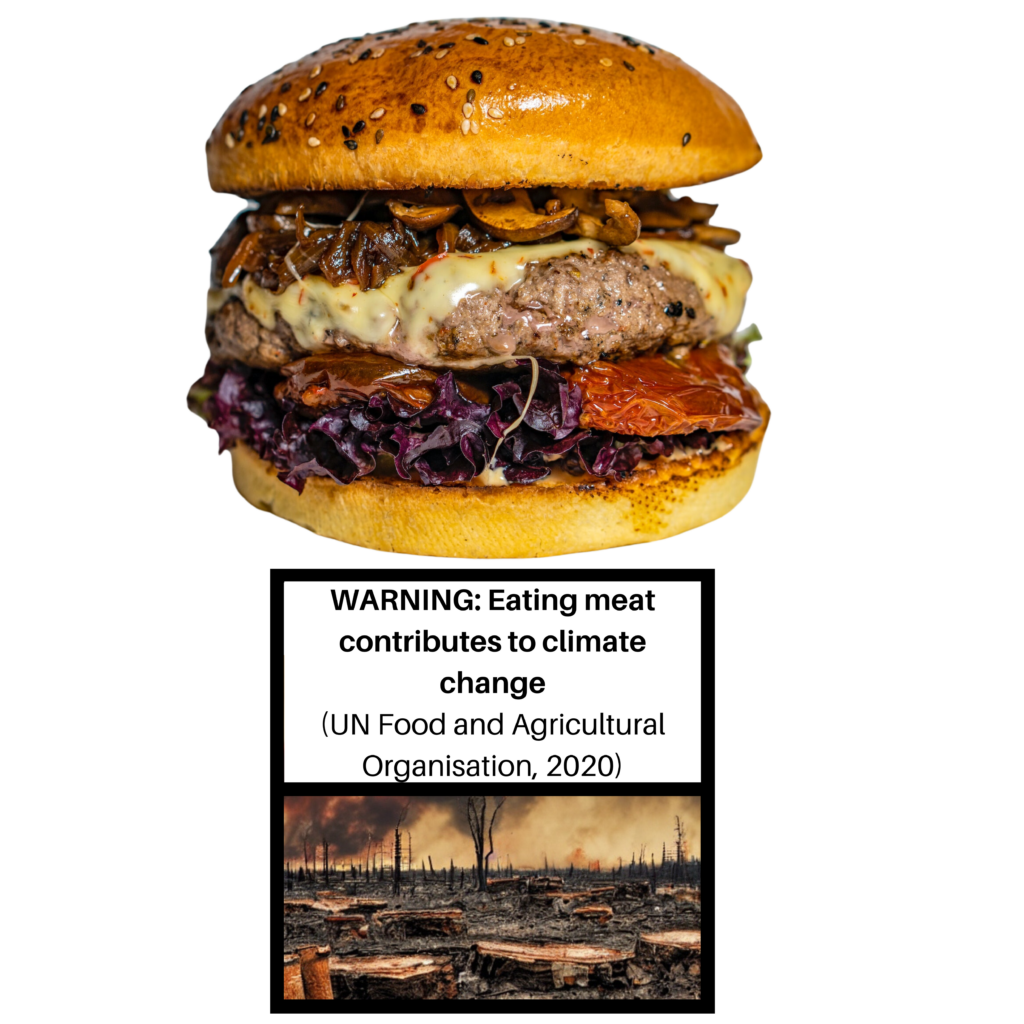
The participants found the climate warning labels to be the “most credible”. These labels showed fire-charred landscapes and read: “Warning: Eating meat contributes to climate change.”
#Finally! New Yorker Mag finally admits in 2023: ‘COVID Lockdowns Were a Giant Experiment. It Was a Failure’

Over 200 health journals call on the UN & WHO to recognize ‘climate change’ as ‘a global health emergency’
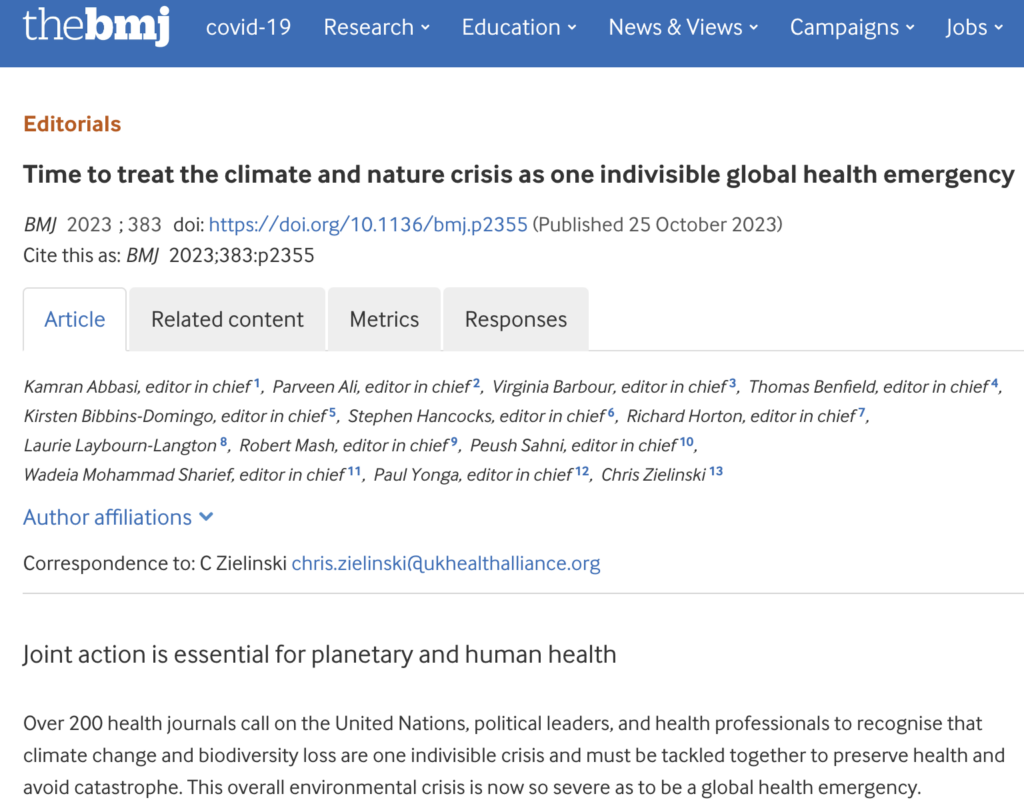
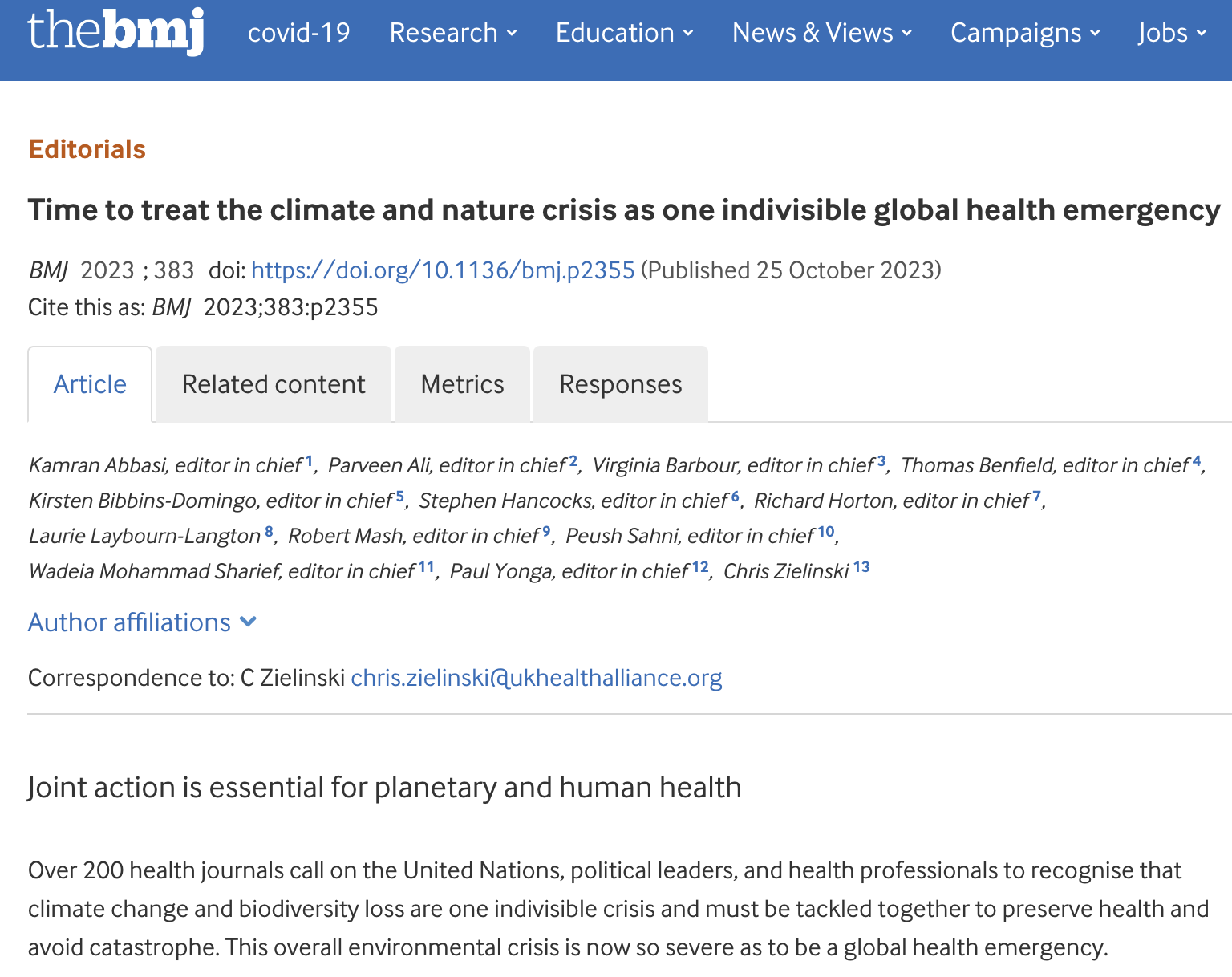
British Medical Journal: Published 25 October 2023: Over 200 health journals call on the United Nations, political leaders, and health professionals to recognize that climate change and biodiversity loss are one indivisible crisis and must be tackled together to preserve health and avoid catastrophe. This overall environmental crisis is now so severe as to be a global health emergency…
Human health is damaged directly by both the climate crisis, as the journals have described in previous editorials, and the nature crisis. …
The World Health Organization should declare the indivisible climate and nature crisis as a global health emergency. The three preconditions for WHO to declare a situation to be a public health emergency of international concern are that it is serious, sudden, unusual, or unexpected; carries implications for public health beyond the affected state’s national border; and may require immediate international action. Climate change seems to fulfil all those conditions. …
We must recognise this crisis for what it is: a global health emergency.”
#
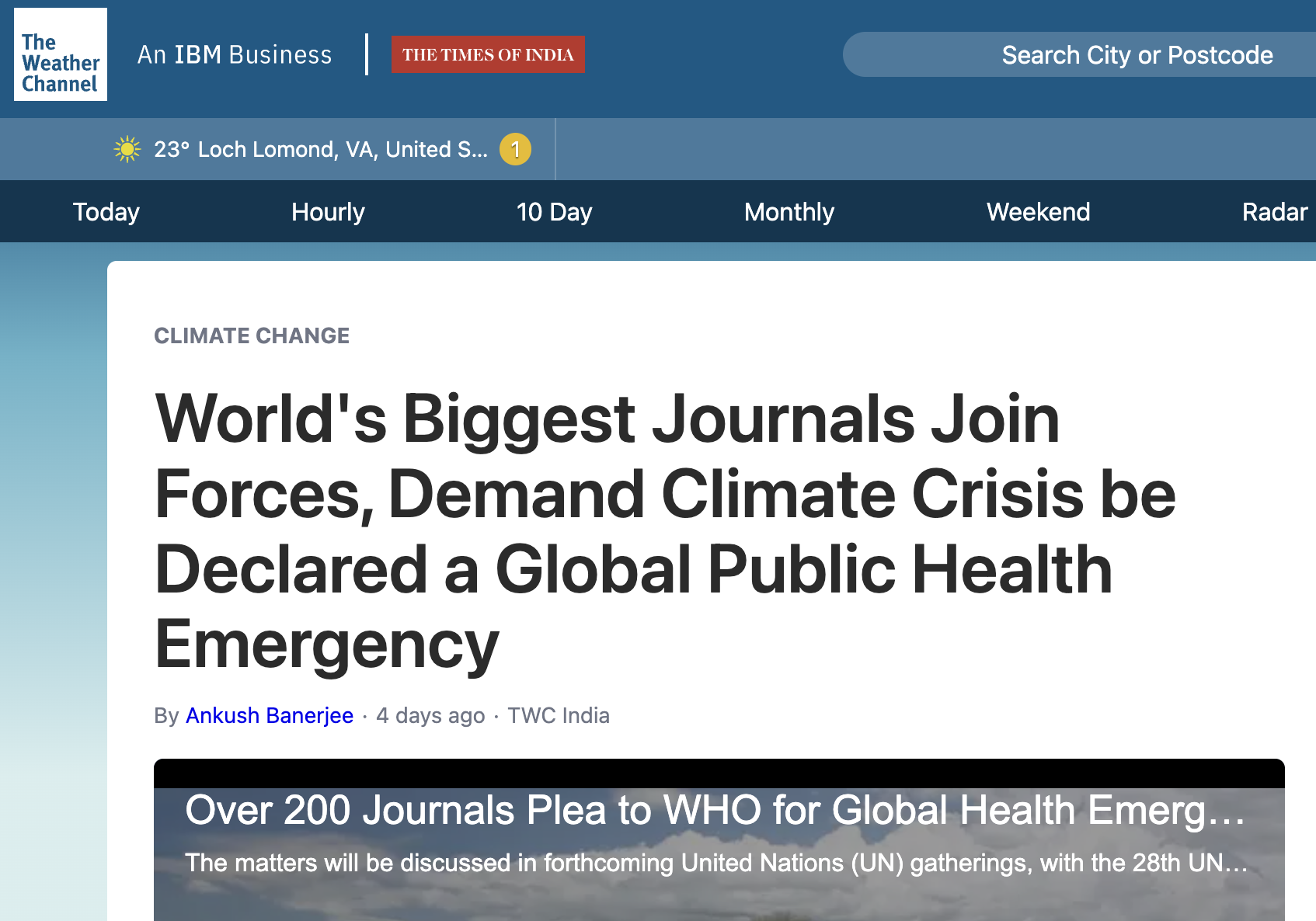
Reality Bites: Why Wind, Solar, And Electric Car Advocates Must Also Love Fossil Fuels – ‘Blocking fossil fuel development increases
cost for renewables’Net Zero Will Require a Command Economy & Massive Drop in Living Standards, Says Cambridge Professor. And for What?
But perhaps by 2050 the realisation will begin to dawn. There will not have been the slightest detectable impact on the climate. … But after spending all that money and throwing all that labour into Net Zero, the weather extremes, whatever they are and whatever they are caused by, will continue. …
There will be no impact on the climate for the lifetimes of those who have poured their lives and money into Net Zero. There will be no impact on the lives of their children, their children’s children, or for many generations after that. There will be no suspension of extreme weather events because extreme weather events are a fact of life and always have been. How many fewer extreme weather events would need to be counted for Net Zero to be deemed a success?Watch: Morano on Fox & Friends on movement to restrict airline travel to four flights per person per lifetime – ‘You will go nowhere & be happy’
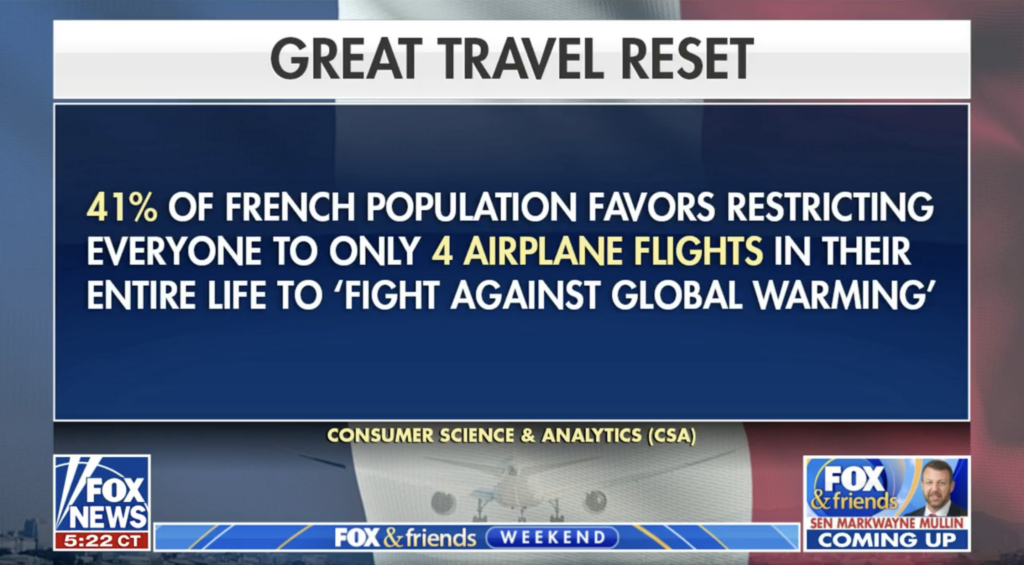
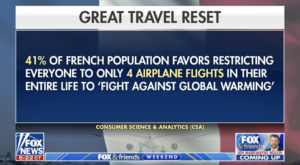

Joey Jones: The poll shows 41% of the French population thinks travelers should restrict airline travel to only four times in their entire life. Climate Depot publisher Marc Morano joins us now to react mark that is a staggering number. Help us out. Here’s the Climate Dissent You’re Not Hearing About Because It’s Muffled by Society’s Top Institutions
Analysis: Biden’s billion-dollar oil mistake: Biden hamstrung his country from Day One – ‘Aggressive support for ESG’ – ‘Proxy war against Russia’ & ‘Sabre-rattling approach to China’
Stay in the Know
Copyright 2024 © All rights Reserved.

